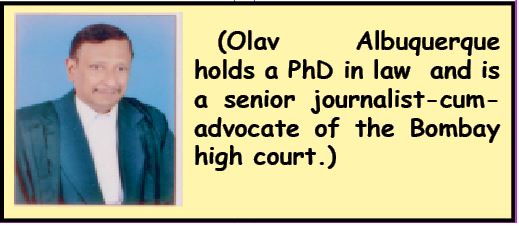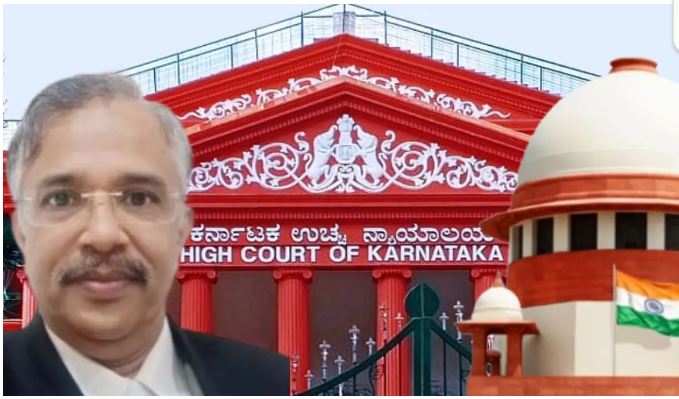THE Bombay high court has contributed the maximum number of judges to the Supreme Court although we have never had one from Goa. So, what took place with a judge from the Karnataka high court is unlikely to ever take place in Goa. But what took place?
The Karnataka high court uploaded a warning to all litigants and lawyers. The warning was to desist from recording court proceedings and uploading them on the internet, immediately after one of its judges was cautioned by a five-judge bench of the Supreme Court, regarding sexist remarks against a woman advocate, who had replied to a question posed by the judge to a male advocate.
When the woman advocate replied to a question he had put to a male advocate, the judge remarked that the woman lawyer was so familiar with the “opposition party” that she might even know “the colour of their undergarments.” “Casual observations may well reflect a certain degree of individual bias particularly when they are likely to be perceived as being directed to a particular gender or community,” the bench said.
Justice Vedavyasachar Srishananda, a sitting judge of the Karnataka high court, who had made those observations, had on September 21, 2024 tendered an apology for his comments in the open court there. Judges of the 24 high courts and the Supreme Court show a degree of sophistication and aloofness while bantering with the advocates during proceedings in court. Jokes enliven the monotony of court proceedings but such remarks made by Justice Srishananda depict unusual crudeness totally absent among high court judges.
Remember, the same judge had got into an earlier controversy for referring to a minority-dominated area of Bangalore city as “Pakistan” — which again attracted the attention of the apex court. The five-judge bench had called for a report of what had transpired in the courtroom after the sexist remarks of the judge went viral. The judge later apologized in open court for his crude joke.
In a separate incident, the Supreme Court had struck down the remarks of a bench of the Allahabad high court which had remarked in a case of alleged forced conversion: “If these conversions are allowed to continue, then the majority Hindu population will turn into a minority.” The apex court not only expunged these remarks from the judgment but directed that this judgment should not be treated as a precedent or cited in subsequent judgments.
POWERFUL BODIES
WHAT is remarkable is that sometimes, judges are at the receiving end of flak for pulling up powerful bodies like the Election Commission of India (ECI). These bodies then have the clout to garner support against these judges. In 2021, the then chief justice of the Madras high court, Sanjib Banerjee, had orally remarked that the ECI was singularly responsible for the second wave of the Covid-19 pandemic and its officials should be tried for murder.”
An irate ECI approached the Supreme Court with a complaint against the upright judge. The ECI had argued that the media should be banned from reporting oral remarks of judges, they should only publish from signed judgments. Luckily for the media, the apex court dismissed this plea. But Justice Banerjee was transferred to the tiny Meghalaya high court as its chief justice, where he retired after allegedly being put in his place by the ECI.
Soon after this, the then Chief Justice of the Madras high court was transferred from this third oldest high court in the country. Even a judge of the Supreme Court was not spared, for upbraiding a powerful ruling party spokesperson for intemperate remarks, during a TV news hour debate against a prophet of the minority community.
Be that as it may, judges enjoy absolute privilege within their court rooms, so that whatever they say or do during the course of a litigation which is ongoing before them, is immune from any civil or criminal action. Even Parliament cannot discuss a judge’s conduct in court during a trial.
But the remarks of the Karnataka high court judge transgressed all limits of decency, which was why the five-judge bench was justified in calling for a report from the Karnataka high court. Rather than comply immediately with the Supreme Court directive, the registry chose to go one step ahead and warn all and sundry against uploading court proceedings on the internet.
There have been cases where a Supreme Court judge like Justice Arun Mishra extolled Prime Minister Narendra Modi as being a “genius who thinks globally but acts locally.” Given that the government is the largest litigant before the Supreme Court, these remarks raise misgivings of bias in favor of the government. Justice Mishra in fact, did deliver a large number of judgments in favor of the government.
The point is that judges are trained to be reticent and when they are victimized, their only remedy is to voice their grievance to the Chief Justice of India who is the head of the judicial family. The CJI does not act alone but consults his colleagues, who are familiar with the work ethics and reputation of the judge in question. Prima facie, there was no need to transfer CJ Banerjee to an insignificant high court for strong remarks made in open court which he was justified in doing.
JUDGES AND JUDGES
THERE is a world of difference between judges like Chef Justice Banerjee and Justice Vedavyasachar Srishananda. Just as there was a world of difference between a former Karnataka woman high court judge BS Indrakala, who paid an astrologer, Yuvraj Swami, Rs8.27 crore as a bribe to get herself sworn in as a governor of the state.
What emerges from all this is that the system of the high court chief justice, consulting his two senior most colleagues to invite advocates to join the bench is imperfect, because the Intelligence Bureau does a slipshod job and politicians do have the last word in who will become a high court judge or whether a certain judge is friendly to the government of the day or not.
The final worrying trend is that a few judges misuse their freedom and privileges, to lower the prestige of the judiciary within the court rooms, by uttering words they should refrain from uttering, while other judges who are upright may be victimised for saying what they were justified in saying in their court rooms.

